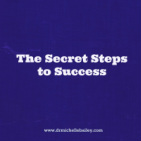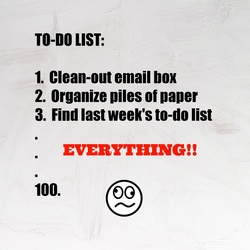|
7/18/2014 0 Comments Creating SMART-R Goals Many people set goals, especially at the start of a new year. Think about the goals you set for yourself in January. Have you accomplished what you set out to do? Do you remember what they were? Unfortunately, the majority of people abandon the goals within 30 days. Why? Creating new habits requires an intention to do the work AND taking consistent action. Many times there is a failure to set up systems and structure that keep your goals front of mind. Wishing and hoping that things will be different doesn’t make things happen. Change results when things are done differently. And, it takes time to develop a new habit. Some experts say anywhere from 21 days to 6 weeks. Planning increases the likelihood of success. Investing the time up front to consider what is needed to make meaningful changes in your life will pay off, delivering the results you desire. To increase your odds of success, set SMART-R goals: Specific: Your goal needs to be clear, focused and concise. “I want to eat better” is a vague goal. “I will eat breakfast every day” is a specific goal. Consider the following questions to develop your goals: - What do you want to accomplish? - Why do you want to do this? - What do you need to support you in meeting your goal? - How will achieving this goal make a difference in your life? Measurable: When your goal has metrics that you can chart, you are better able to track your progress along the way. Action-oriented: Your goal needs to be focused on the results you want to achieve. Realistic: Make sure that your goal is within reach. Many failed attempts with accomplishing goals involves things that are beyond your control. Set a goal that is within your control, in other words, change on your part can bring about results and is not dependent on someone else changing their behavior. Timely: decide upon a timeline for meeting your goal. If you don’t currently exercise, saying you will exercise for 20 minutes per day, 4 days a week for 4 weeks may sound more doable than promising to do this new behavior forever. Reward: incentives are great motivators for taking action. Think about how you will reward yourself when you reach your goal. Make it something that is meaningful to you (Note: I don’t suggest you use food as a reward). Tips for increasing success: - Get clear. Focus on one or two goals at a time. It takes time to change habits. Taking on too much at one time can lead to overwhelm. You can add more goals as you accomplish the initial ones. - Commit to a tracking system. Decide how you will track your progress. Tracking is a valuable activity to provide you real-time information on what’s working well and what’s getting in the way of moving you towards achieving your goal. - Define your goal period. Set a start date and a completion date. Having a deadline tends to move people towards action compared to an open-ended goal period. - Create gentle reminders. Keep your goals in a place where they are visible. This will remind you of what you are working on regularly. Goals that are out of sight are generally out of mind. - Be flexible. Life happens. Be prepared to modify goals and timelines if needed depending on the situation. Give yourself permission to “re-decide” if needed. - Find accountability. Knowing that someone will check in with you keeps you more focused. This may be a trusted friend, coach, or mentor. Determine how often you will check-in and what method you will use (i.e. phone, email). How are you doing on the goals you set at the beginning of the year? Share your comment below and let us know what helped keep you on track or what got in the way.
0 Comments
 Ah, the dreaded to-do list. I created them all the time. On post-its, little scraps of paper, or sometimes in my planner (depending on which one I was using this week). You can spend an awful lot of time creating lists and yet, nothing seems to get done. Or at least that's the way it feels. When the to-do list is long or filled with unpleasant tasks, it's easy to feel a sense of overwhelm. You feel stuck. There's no way it will all get done. You could waste a lot of time worrying; or, you can regroup and create a new game plan. Consider the following 5 practices to help you regain a sense of control and be more productive. 1. Breathing. No, this doesn't require any deep breaths or other breathing exercises. It is simply paying attention to the natural rhythm of your own breathing. When we feel overwhelmed, it is often accompanied by anxiety. This leads to more shallow, rapid breaths. It's almost like we're holding our breath, literally afraid to exhale. Tuning in to the rhythm of your breathing connects your mind with your body and launches a calming process within your body. Try it now: simply notice the place where you can feel your breath the most - maybe as the air enters and exits your nostrils, or as it moves across your slightly parted lips; you may feel it best at the back of the throat or just sense the movement of your chest or rise and fall of your belly with each breath. Now, pause for a moment to notice how you feel. Are you feeling calmer? More relaxed? Breathing slower? It's just that easy. You just have to remember to breathe. Practice noticing your breath the next time you're feeling overwhelmed and watch what happens. 2. Making Decisions. When you're hanging out in the land of overwhelm, it's hard to know what to do next. And that can make it hard to know what to do when you reach a choice-point. When you avoid or delay making decisions it stalls your progress and keeps you stuck. I remind the busy professional women that I work with that indecision is actually a decision. You are giving up your control to someone else (anyone else). It is common to hesitate making decisions for fear of making a mistake, or disappointing someone. But, once you become more familiar with making decisions, you will feel more comfortable with the process. Start with small decisions that are low risk. What are you going to have for dinner? What time are you going to go to bed tonight (yes, it's important to have a scheduled bed time; more on that in a future blog post)? Even when you feel you need more information to make a decision, decide when you're going to make the decision (I learned this from my amazing coach, Christine Kane - thanks Christine!). 3. Taking imperfect action. This is another one I can thank Christine for (one of the many benefits of having a coach). For those of us who consider ourselves perfectionists, it can serve to paralyze us. We either spend an excessive (and unnecessary) amount of time on a task or we delay starting it or completing it because we're waiting for it to be perfect. Once you decide what needs to get done, breathe, and take action. It doesn't have to be perfect. Most of life is an iterative process. And, the side benefit is when you take imperfect action, you learn and grow while moving forward towards meeting your goal. 4. Celebrating your successes. Especially the little things...these often get completely overlooked. I know for me, I would sometimes spend so much time focused on all that had to get done, that I couldn't see how much I'd actually accomplished. I'll let you in on a little secret. Okay, are you ready? You can't get everything done. And, everything that is on your list, probably doesn't need to be there (again, that's for a future post). Take a few moments at the end of each day, to write down what you accomplished. Include things that involved making time to take care of yourself (exercising, preparing a healthy meal, taking a warm bath). Now, celebrate by giving yourself a pat on the back. Say, "I'm proud that I accomplished "x" today. Making this practice a regular part of your daily routine will help to boost your confidence and fuel your energy to take action on what needs to get done. 5. Correcting course. This one has been one of the hardest for me, personally. I would often find myself stuck because I was unwilling to admit that the plan I created is no longer working and needs to be changed. There are times when I'm in the car using Waze to navigate to my destination when I'll hear a little sound followed by a swirling circle as the program indicates it's "recalculating". Our lives are the same way. There will be times when we make a poor decision or head down the wrong road. But fortunately we have the capacity to recalculate - reassess where you are - determine your destination (it may be a new one) - and re-chart your course. Practicing the 5 strategies above will serve you well when you're feeling stuck. Consider ways to trigger your memory to use these tools when you most need them. Print them out and post them on the refrigerator. Or, set a reminder to pop-up with one or more of the practices listed. I hope you find them helpful you pivot as you get unstuck and move forward (while breathing a little easier). Let me know how the practices help you and what tips you have for remembering to use them. Leave a comment below. |
Life Beyond Clinical Practice with Dr. Michelle Bailey
|

|
Hi, I'm Dr. Michelle Bailey.
I help physicians who are unhappy or unsatisfied with their current career find a nonclinical career that they love. Retiring early from clinical practice after almost 20 years as a board-certified pediatrician I successfully made the leap and transitioned to a nonclinical career. I'm thriving in my new career and am on a mission to help other physicians do the same with the support, guidance, and community that I wish I had when I was struggling with this decision. You're invited to connect with me in my private Facebook community for physicians to learn about all things related to your nonclinical career transition. Join here. |
Archives
April 2023
December 2021
November 2021
October 2021
September 2021
August 2021
July 2021
June 2021
May 2021
April 2021
March 2021
February 2021
January 2021
July 2020
April 2020
December 2018
June 2017
December 2014
August 2014
July 2014
June 2014
May 2014
April 2014
February 2014
Categories
All Being Present End Of Year Energy Drains Exercise Feel Free Fitness Free Yourself Getting Things Done Goals Health Leadership Life Lessons Life Vision Mind Body Connection Mind-body Connection Mindfulness Recharging Your Batteries Ritual Self Care Self-care Success Women's Empowerment Women's Health Work Life Balance
Copyright 2023. Michelle Bailey & Company, LLC.
www.drmichellebailey.com. All Rights Reserved.
www.drmichellebailey.com. All Rights Reserved.
Proudly powered by Weebly
 RSS Feed
RSS Feed